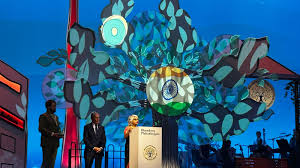India among 6 countries conferred with Bloomberg Philanthropies Awards for Global Tobacco Control

India has once again reinforced its global leadership in public health by being one of only six nations recognized for outstanding tobacco control initiatives in 2025. The Bloomberg Philanthropies Awards for Global Tobacco Control, announced in conjunction with World No Tobacco Day, celebrated India’s persistent and impactful efforts under the WHO-recommended MPOWER framework.
India’s Award-Winning Tobacco Control Efforts
The recognition is not just a symbolic gesture—it highlights years of sustained work in reducing tobacco consumption and safeguarding public health. India’s award, specifically credited to the State Tobacco Control Cell, Department of Health and Family Welfare, Government of Karnataka, showcases the country’s state-level commitment in driving national progress.
The award highlights Karnataka’s effective implementation of WHO’s MPOWER strategies:
- Monitoring tobacco use
- Protecting people from tobacco smoke
- Offering help to quit
- Warning about the dangers of tobacco
- Enforcing bans on advertising
- Raising taxes on tobacco products
Karnataka has become a model state, exemplifying strong policy enforcement, public awareness campaigns, and rigorous monitoring of tobacco product distribution and consumption.
A Significant Global Recognition
Bloomberg Philanthropies, known for investing over $1.5 billion globally in tobacco control efforts since 2007, announced the awards to spotlight global leaders in tobacco control. This year’s awardees were selected from various WHO regions, with each recipient demonstrating exceptional progress in curbing tobacco use.
Alongside India, five other countries received the prestigious honor:
- Australia
- Brazil
- Indonesia
- Mexico
- Ukraine
Each country, including India, has tailored the MPOWER strategies to suit its national context, showing how localized action can lead to globally recognized success.
Karnataka’s Role in Reducing Tobacco Harm
Karnataka’s recognition stems from several key interventions:
- Public Smoking Bans: Strict enforcement of smoke-free public spaces, including educational institutions, hospitals, and public transport hubs.
- Cessation Services: Expansion of cessation helplines, community health worker training, and support services for individuals attempting to quit.
- Youth Education: Comprehensive anti-tobacco education campaigns targeting youth through schools, social media, and interactive community programs.
- Tobacco Vendor Regulation: Introduction of rules to restrict the sale of tobacco near schools and other sensitive areas, alongside routine compliance checks.
- Graphic Health Warnings: Effective implementation of warning labels on tobacco packaging, as mandated by India’s Cigarettes and Other Tobacco Products Act (COTPA).
These combined efforts resulted in measurable declines in tobacco usage, particularly among adolescents and rural populations.
India’s Tobacco Burden and the Need for Reform
Tobacco use continues to be one of the largest public health challenges in India. According to the Global Adult Tobacco Survey (GATS), around 28.6% of Indian adults use tobacco in some form. The burden is not only medical but economic, with tobacco-related illnesses costing the country billions in healthcare expenses and lost productivity.
India is also the second-largest consumer and producer of tobacco globally, making its public health strategy all the more vital. Reducing consumption requires a delicate balance between regulation, education, enforcement, and community engagement.
WHO and Bloomberg: A Strategic Partnership
The World Health Organization (WHO) partnered with Bloomberg Philanthropies to encourage adoption of the MPOWER strategy across member nations. Their goal is to reduce tobacco use worldwide by emphasizing evidence-based interventions.
Michael R. Bloomberg, founder of Bloomberg Philanthropies and WHO Global Ambassador for Noncommunicable Diseases, has long emphasized the need for data-driven policies. “When governments act boldly to implement proven measures like those in the MPOWER package, they save lives—and that deserves recognition,” he stated at the 2025 awards announcement.
Global Trends in Tobacco Control
This year’s awards also reflect a growing global movement toward stricter tobacco regulation. Countries like Australia, which introduced plain packaging laws early on, and Mexico, with its comprehensive smoke-free laws, have shown how government action can shift public behavior.
India’s inclusion among these nations sends a strong message: Low- and middle-income countries can lead the fight against tobacco, provided there is strong political will, effective policy enforcement, and public participation.
Public Health Experts Applaud India’s Progress
Public health advocates across India and globally have praised the recognition. Dr. Rakesh Sharma, a tobacco control expert at the Public Health Foundation of India (PHFI), remarked:
“This award is a validation of India’s dedication to a tobacco-free future. Karnataka’s model proves that even within a federal system, states can act independently to drive real change.”
The Road Ahead: Building on Momentum
While the award is a significant milestone, experts caution that the fight is far from over. The tobacco industry continues to adapt, using digital marketing, surrogate advertising, and product diversification to reach new users—especially youth.
India must now focus on:
- E-cigarette and vaping regulations
- Tighter online marketing controls
- Strengthening taxation and compliance systems
- Expanding cessation programs to rural and underserved areas
Final Thoughts
India’s selection among the six recipients of the 2025 Bloomberg Philanthropies Awards for Global Tobacco Control is a powerful acknowledgment of its leadership and innovation in public health. The recognition of Karnataka’s efforts proves that strategic, localized action aligned with global best practices can yield impactful results.
As tobacco-related diseases continue to affect millions, this award serves as both an honor and a reminder: the war against tobacco is winnable—but only through sustained effort, community awareness, and political will.






